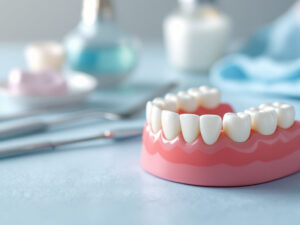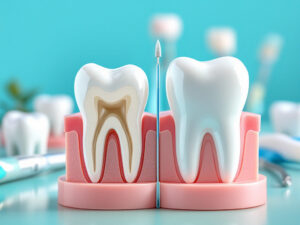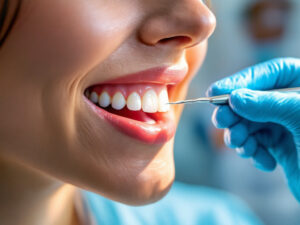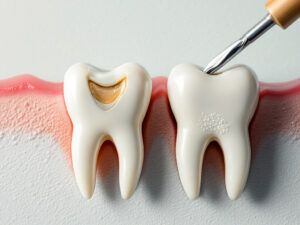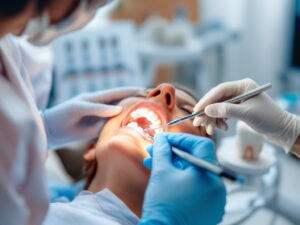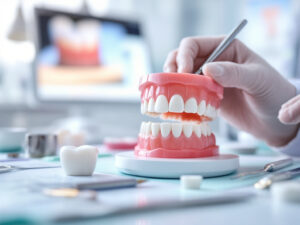Explore gum disease basics
Gum disease treatment is a crucial part of preserving your oral health and overall well-being. If you have ever noticed bleeding gums while brushing or experienced persistent bad breath, you may be showing early signs of gum disease. According to the Cleveland Clinic, almost half of all adults in the United States have some form of gum disease, making it the primary cause of tooth loss. Despite its prevalence, gum disease often goes unnoticed in its earliest stages. Fortunately, with the right knowledge, consistent oral hygiene, and professional care, you can prevent gum disease from getting worse, preserving not only your teeth but also your general health.
Gum disease, technically known as periodontal disease, is a serious infection of the gum tissues. It typically begins as gingivitis, which affects only the soft gum tissue. When left unchecked, it can lead to periodontitis, an advanced stage that impacts both gums and bone, potentially leading to tooth loss. In addition, infections in your mouth may have broader health implications, causing a higher risk of certain systemic conditions like heart disease or even stroke (Medical News Today).
Although these risks sound alarming, the positive news is that gum disease can usually be managed with early detection and a thorough, individualized approach. You do not need to face these challenges alone, especially when you work with a supportive dental practice like Cloninger Dentistry that understands the unique situations you and your loved ones might experience. By exploring the basics of gum disease, recognizing contributing factors, and seeking professional gum disease treatment when necessary, you are taking the first step toward ensuring a healthy smile for years to come.
Identify common risk factors
Gum disease may affect adults of all ages, but certain factors put you at higher risk. Understanding these elements can help you prevent or address problems more effectively, ensuring that you have the support necessary for lasting oral health. While some of these factors can be controlled, others are beyond your immediate influence.
- Poor oral hygiene: Inconsistent brushing or flossing allows bacteria-laden plaque to build up on teeth, leading to gum inflammation.
- Smoking or tobacco use: Tobacco compromises your immune system and reduces your gums’ ability to heal.
- Genetic predisposition: Some individuals are genetically more prone to gum disease, making consistent checkups even more important.
- Chronic health conditions: Diabetes, for instance, can make it more difficult to fight off infections related to your gums.
- Certain medications: Prescription drugs that cause dry mouth can encourage bacterial growth, increasing your risk for gum disease.
- Hormonal changes: Fluctuations such as pregnancy or menopause may heighten gum sensitivity, resulting in gum inflammation.
- Substance abuse: Prolonged substance misuse can weaken the immune system and deteriorate your oral health, just as it can affect other parts of your body.
Even if you cannot eliminate every risk factor, you can at least take active measures to manage them. For instance, if you smoke, reducing or quitting can make a profound difference in your gum health and boost your body’s natural healing process. Having a routine dental checkup at Cloninger Dentistry allows for early detection of gum issues, enabling you and your dentist to create a prevention or treatment plan that aligns with your needs.
Know your treatment options
When it comes to managing gum disease, catching the problem early is key. Your gum disease treatment will vary depending on how advanced the condition is. Typically, gingivitis—the earliest stage—responds well to a combination of professional cleaning and at-home care improvements. Once it progresses to periodontitis, you may need more specialized interventions. Fortunately, various treatment options exist that can be adapted to your situation, from simple preventive practices to sophisticated surgical techniques.
Practice preventive oral hygiene
Your first line of defense against gum disease starts at home. Preventive oral hygiene habits can significantly slow or halt the progression of gingivitis, decreasing your risk of more serious gum issues.
- Brush effectively: Aim to brush your teeth twice a day using a soft-bristled toothbrush and fluoride toothpaste. Move the brush in gentle, circular motions along the gumline, avoiding aggressive scrubbing that could cause gum irritation.
- Floss daily: Flossing removes plaque and food debris from areas your toothbrush cannot reach, such as between teeth.
- Rinse appropriately: An antibacterial mouthwash can help reduce oral bacteria. According to several studies, natural rinses such as lemongrass or aloe vera mouthwash have also shown promise in reducing plaque and gingivitis (Healthline). Always follow your dentist’s recommendation if you are considering new mouthwash options.
- Get regular checkups: Scheduling routine visits to Cloninger Dentistry ensures early detection of gum-related problems. You may also consider a professional teeth cleaning to remove plaque and tartar buildup effectively.
Use nonsurgical approaches
If your gum disease has developed beyond mild gingivitis, you might need nonsurgical procedures to remove plaque and tartar below the gumline. These methods focus on targeted cleaning and may include the following:
- Scaling and root planing: Often referred to as a deep cleaning, scaling removes tartar from beneath the gums, and root planing smooths out the tooth surface. This discourages further bacterial accumulation.
- Antibiotics or antimicrobials: When infections are more acute, your dentist may recommend a short-term antibiotic regimen or a localized antimicrobial treatment to control bacterial buildup.
- Laser therapy: Some dental practices use lasers to remove diseased tissue while preserving healthy tissue. According to research, laser-assisted periodontal therapy can enhance healing and reduce discomfort (Dr. Scharf Periodontics).
These nonsurgical measures can often resolve early or moderate periodontal issues, preventing the need for more extensive procedures. Combined with improved home care, they can diminish the severity of the disease and, in many cases, steer you back towards healthier gums.
Rely on surgical procedures
If periodontitis is advanced or if nonsurgical methods are not sufficient, surgical gum disease treatment may be recommended. Surgical approaches typically reduce pocket depth and repair damaged bone or soft tissues. They can include:
- Pocket reduction (flap surgery): Your dentist or periodontist lifts the gums to gain direct access to the roots for deeper cleaning, then repositions the tissue snugly around the teeth.
- Bone grafting: If periodontitis causes bone loss, a bone graft—often a synthetic or donated material—can help regenerate lost tissue and restore stability around teeth.
- Gum grafting: Also known as a soft tissue graft, this procedure involves taking a small amount of tissue from another area of your mouth and attaching it to your gums, covering exposed roots and boosting gum thickness.
- Guided tissue regeneration (GTR): A special membrane is placed between the gum and bone to facilitate new bone growth and reduce pocket depth.
These surgical interventions focus on eradicating stubborn bacteria while restoring the structural integrity of your gums and bone. When combined with consistent care, they can greatly improve your prognosis, preserving teeth that would otherwise be lost.
Consider innovative therapies
Dental research continues to expand, offering innovative approaches that complement traditional gum disease treatment. While some of these specialized methods may not be widely available yet, they hold promise for future care:
- Platelet-rich fibrin (PRF) or platelet-rich plasma (PRP): These growth-factor-rich substances are derived from your own blood and used to bolster the healing process. They can accelerate tissue regeneration and reduce post-procedure recovery time (Dental Innovations).
- Stem cell therapy: Although still experimental, stem cell applications in dentistry show potential for regrowing lost periodontal tissues, potentially eliminating advanced issues without relying solely on grafts.
- Host modulation therapy: Anti-inflammatory agents and other targeted treatments help regulate your body’s immune response, reducing tissue destruction while allowing healing to occur.
Innovations like these may become part of standard practice over time, leading to fewer invasive measures and more personalized solutions.
Choose Cloninger Dentistry for care
Your oral health journey is multifaceted, and gum disease is just one piece of the puzzle. Having a trusted dental partner who can provide comprehensive, patient-centered treatment is indispensable. At Cloninger Dentistry, we believe you deserve a supportive environment where your concerns are addressed thoroughly. Our practice brings expertise and empathy into every appointment, helping you feel confident about your next steps.
Comprehensive family offerings
We understand that your oral health needs change over time, and they can vary among family members. Children, for example, might need pediatric dental care to nurture good habits from an early age, while others may need toothache pain relief or root canal therapy. By offering a wide range of services—from basic checkups to complex gum disease treatment—our team can keep you and your entire family on track for healthy smiles. Some of our relevant services include:
- Professional teeth cleaning to prevent plaque buildup
- Fluoride treatment for strengthened enamel
- Oral cancer screening to identify potential risks early
- Periodontal maintenance cleaning to help you manage gum disease long-term
Personalized approach
We never assume that one plan works for everyone. Instead, we create an individualized care strategy, factoring in your medical history, lifestyle, and specific oral challenges. Whether you need close monitoring after a gum procedure or additional guidance on preventive techniques, we adapt our approach to fit your situation. Your comfort and confidence are paramount to us, and we aim to accommodate your needs every step of the way.
Sometimes, individuals feel apprehensive about undergoing any type of dental procedure. We acknowledge these fears and aim to provide a calm, empathetic environment. Our goal is to ensure that you feel fully informed and empowered to make decisions about your gum disease treatment. If you ever have questions or concerns, we welcome open communication so that we can address them right away.
Maintain your progress at home
Long-lasting oral health results require consistent actions from you—both in your daily routine and in coordination with professional care. Even if you have undergone extensive gum disease treatment, sustaining healthy habits guards against relapse and reduces your risk of new infections.
Daily routines
- Brush thoroughly: Use a soft-bristled brush and gently clean every tooth surface for two minutes each time.
- Floss and rinse: Slide floss between each tooth using a clean section of floss. Follow up with an antiseptic or specialized antimicrobial mouthwash if recommended by your dentist.
- Eat balanced meals: A diet loaded with vitamins and minerals helps strengthen gums and keeps damaging bacteria at bay.
- Drink water often: Water helps wash away food debris, preventing bacteria from thriving.
Regular checkups
Even if you maintain impeccable home-care habits, plaque accumulates in hard-to-reach areas. Regular visits to Cloninger Dentistry allow our team to target those tricky spots, identify early warning signs of gum disease, and clean away any buildup before it causes significant damage. While you are at the office, discuss any new concerns or symptoms, such as sensitivity or bleeding, since they might indicate shifting oral health conditions.
Lifestyle adjustments
Changes in lifestyle can also boost your gum health. For instance, controlling chronic conditions such as diabetes supports your immune response and speeds healing. Avoiding tobacco and reducing stress can also reduce inflammation in your gums. If you struggle with preserving healthy habits, our supportive staff can offer resources and suggestions, such as specific brushing techniques or specialized products to make home care more enjoyable and effective.
Frequently asked questions
-
What happens if I do not treat gum disease early?
Left unaddressed, gum disease may progress from gingivitis to periodontitis, which can cause gum recession, tooth mobility, and tooth loss. In advanced cases, the underlying jawbone can deteriorate. In addition, bacteria from your gums may spread bodywide, leading to risks like heart disease and stroke (Medical News Today). -
How often should I go for professional cleanings if I have gum disease?
You might need more frequent deep cleanings, often every three to four months, particularly in the early stages of gum disease treatment. This schedule helps manage bacterial growth and allows your dental team to monitor your gums for ongoing healing. -
Is gum disease painful?
In many cases, gum disease does not cause significant pain until it reaches advanced stages. Early signs include bleeding gums, persistent bad breath, and slight redness. Once you notice any changes in your gums, it is best to seek a routine dental checkup for an evaluation. -
Will I need surgery for moderate gum disease?
Not always. Moderate gum disease can sometimes be managed with nonsurgical methods, including scaling, root planing, and targeted antibiotic therapy. However, if these are not sufficient, you and your dental professional may consider pocket reduction surgery or other surgical approaches. -
Can I get gum disease again after successful treatment?
Yes, gum disease can recur, especially if you resume poor oral hygiene or avoid follow-up visits. Once you have had gum disease, routine periodontal checkups and periodontal maintenance cleaning become even more important to keep it from coming back. Maintaining daily oral care, scheduling regular dental visits, and addressing any health or lifestyle factors that might exacerbate the disease are key steps in preventing a relapse.
Closing thoughts
Gum disease is a serious yet manageable condition. By focusing on preventive measures, seeking professional gum disease treatment where necessary, and making healthy lifestyle choices, you can protect the structure of your teeth and the long-term vitality of your entire mouth. Cloninger Dentistry’s patient-centered approach is designed to help you feel informed, supported, and encouraged—no matter where you are in your oral health journey.
Beyond gum disease, remember that a holistic view of your dental care helps you stay ahead of other issues. With regular visits and open dialogue with our experienced team, you can enjoy the confidence that comes from a healthy smile. Ultimately, you and your loved ones deserve comprehensive care that addresses your unique challenges, offering you the support necessary for lasting oral health. We at Cloninger Dentistry look forward to helping you achieve the fullest sense of well-being, one step at a time.


